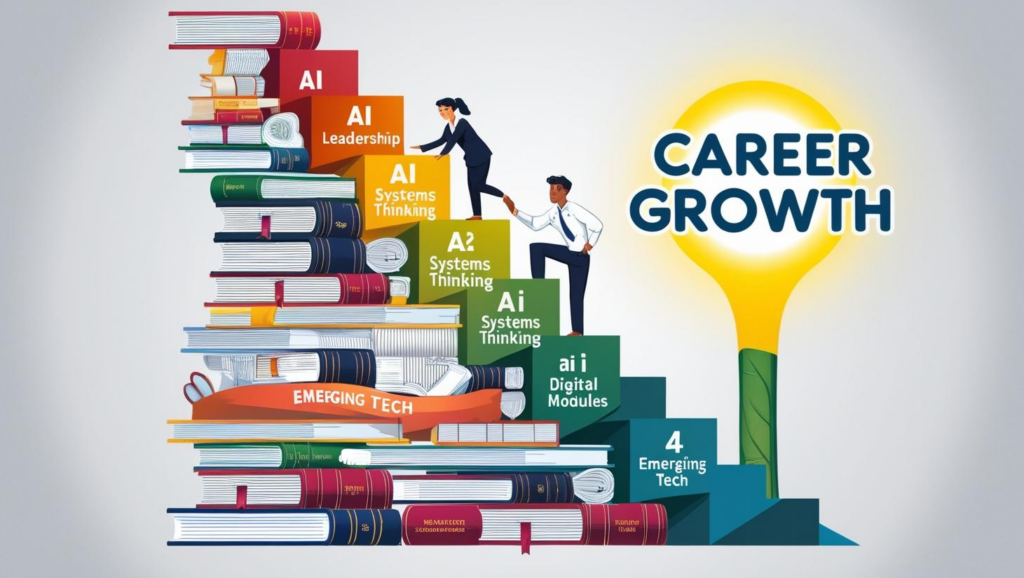
Engineering lures problem-solvers and technologists with promises of stability and innovation. With rapid advancements in technology, this civil and mechanical field is more dynamic than ever before. Engineers today face a landscape teeming with both traditional roles in areas like electrical and structural engineering, and fresh opportunities in space and environmental sectors.
The engineering career landscape teeters between time-tested paths and novel possibilities. While some engineers follow the well-worn technical or management tracks, others carve out new roles born from Industry 4.0. This digital revolution, combined with AI and automation integration, redefines how engineers work and succeed. Locations such as Vancouver, Calgary, Edmonton, and Saskatoon are becoming hubs for these emerging opportunities, attracting engineers and technologists alike.
This article explores these seismic shifts, weighing the allure of management against technical mastery. We delve into the evolving role of technology, the impact of continuous learning, and strategies for ensuring enduring growth and relevance.
Engineering Career Path Options
Engineers have diverse career paths to choose from, allowing them to focus on either technical specialization or leadership roles. Those inclined towards technical intricacies can become senior engineers, principal designers, or tech leads, concentrating solely on advancing their technical expertise in areas like water systems, transportation infrastructure, or space design.
This path enables engineers to work on complex tasks without the responsibility of managing a team. Conversely, the management track merges engineering acumen with leadership skills, orienting professionals towards project management, resource allocation, and cost control.
As engineering needs grow in complexity and scope across numerous industries and locations, there is an increasing demand for professionals with interdisciplinary skill sets. To facilitate smooth transitions into higher roles or leadership opportunities, pursuing a master’s degree in engineering or engineering management is advantageous.
Such academic achievements can enhance career prospects, providing engineers with higher salaries and broader opportunities within permanent positions at leading companies.

Technical vs Management Tracks
When deciding on a career direction in engineering, professionals often choose between technical proficiency and leadership potential. Engineers following the management path generally pursue a Master’s in Engineering Management to hone their skills for making strategic and operational decisions.
This path focuses on leadership, delegation, and strategic planning, allowing engineers to oversee projects related to infrastructure, environmental systems, or space exploration, mentor teams, and make critical technical decisions. Engineering managers collaborate with stakeholders and executive management, often guiding efforts that require strategic alignment with organizational goals and the effective use of resources.
In the technical track, engineers continue to enhance their technical expertise without managerial responsibilities. This path allows for deeper involvement in complex, technical challenges such as designing water treatment systems or developing electrical infrastructure, leading to advanced roles like principal engineer or tech lead.
While both paths frequently report to a Chief Technology Officer (CTO), the management track offers heightened engagement with strategic decisions and leadership tasks. Engineers aspiring to become managers typically need both technical expertise and a strong set of interpersonal skills, supplemented by a degree in engineering management and hands-on training in people management
Emerging Engineering Roles
The evolution of technology has led to the rise of new engineering roles like AI engineering and data engineering, both in high demand. These roles attract new graduates proficient in programming languages such as Python, who are eager to apply their skills in burgeoning fields like space technology and environmental systems.
The landscape of engineering management is also changing rapidly, incorporating business acumen with technical expertise. This combination is crucial for filling roles in project management, director, and executive positions across varied engineering disciplines and locations like Vancouver and Calgary.
Engineering managers now play an indispensable role, making critical decisions about technology, finances, and team dynamics. They are tasked with guiding industries such as mechanical, civil, electrical, and biomedical engineering through the challenges of global competition and increasing technological complexity.
Positions like senior principal engineers and engineering program managers have become pivotal in aligning technical goals with organizational strategies. They provide leadership that encompasses comprehensive technical skills, recognizing the growing importance of their role in driving innovation and efficiency in the engineering field.

The Role of Technology in Engineering Careers
The landscape of engineering careers continues to evolve with the integration of cutting-edge technologies. Industry 4.0 (I4) technologies like Artificial Intelligence (AI), digital twins, and 3D printing are reshaping various engineering disciplines, including electrical and mechanical engineering.
These advancements not only enhance design and troubleshooting processes but also enable engineers to achieve more efficient and accurate product development. The fusion of technical expertise and business strategy becomes imperative as engineering managers oversee complex projects in infrastructure and space systems.
Emerging fields such as genetic engineering and nanoengineering flourish under rapid technological advancements, expanding the career opportunities and influence of engineers across a range of industries.
Impact of Industry 4.0
The advent of Industry 4.0 has significantly transformed the engineering field, particularly by digitizing and automating aspects of various engineering jobs. For civil engineers, this means utilizing building and environmental sensors, AI, and mobile platforms to virtually plan projects. Such tools improve both efficiency and effectiveness in project management. Real-time data processing through the Internet of Things (IoT) further enhances decision-making.
It provides engineers with swift, actionable insights, allowing for strategic decisions that are data-driven and precise, especially in critical areas like water resource management and transportation infrastructure.
Additionally, Industry 4.0 technologies integrate data from sensors and mobile devices to control machines and processes within the engineering sector. The evolution brought on by I4 not only creates new job opportunities but also increases earning potential and fosters leadership roles in engineering careers.
This technological shift is crucial for developing necessary engineering management skills, ensuring that engineers remain competitive and capable in a technologically advanced workspace, whether they are working in Vancouver, Calgary, or other key locations.
Integration of AI and Automation
AI and automation have become instrumental in advancing engineering careers. Mechanical engineering managers use AI technologies like machine learning to simulate products and troubleshoot issues effectively. These tools offer insights that improve the efficiency of engineering processes.
Chemical engineers also benefit from AI, using it alongside simulation-based engineering to digitally transform operations and construct smart supply chains. This approach enhances organizational skills and upskills engineers to handle cutting-edge technologies in areas such as environmental systems and space exploration.
Civil engineers leverage AI with IoT, facilitating the digitalization and automation of project elements. This integration allows for the real-time processing of data, optimizing planning and execution.
Across various engineering disciplines, AI supports strategic decision-making by managing compliance, ensuring adherence to deadlines, and optimizing team coordination. The implementation of AI plays a pivotal role in advancing automation, enabling smart and connected platforms that simplify remote project management and virtual planning, particularly in infrastructure and transportation projects.
AI facilitates a seamless merging of technical skills and engineering management capabilities. Engineers can navigate emerging technologies more efficiently, thereby supporting their career goals in leadership opportunities and diverse engineering jobs.
This alignment with technological advancements empowers engineers to not only succeed but thrive in a rapidly changing environment, whether they are working on space missions with NASA or leading environmental projects in Saskatoon.

The Benefits of Engineering Management
A master’s in engineering management offers significant advantages for those pursuing leadership roles in the engineering field. It provides professionals with the skills necessary to oversee complex projects and lead diverse teams effectively.
These programs focus on advanced project management, finance, leadership, and strategic planning—key components for success in high-level positions such as engineering manager or senior project lead. Graduates are well-prepared to assume roles such as departmental leaders or project managers, often entering the workforce with competitive salaries and advanced responsibilities within permanent positions at leading companies.
Mastering both technical and business skills within these programs makes professionals more appealing to potential employers in a wide range of industries, including space, transportation, and environmental engineering.
Career Versatility
Engineering management creates career versatility by bridging technical skills with business leadership. This unique combination prepares engineers for roles across various industries, enhancing their career mobility.
Specializing in areas like DevOps, cloud engineering, or data engineering further accelerates the path to leadership. The intertwined technical and leadership skills empower professionals to switch roles or transition through different career tracks, even within the same organization.
Pursuing a Master of Engineering Management equips individuals with essential skills like project management and strategic planning, opening doors to diverse leadership roles and significantly influencing career trajectories in locations such as Los Angeles and New York Metro areas.
Leadership Opportunities in Engineering
Leadership opportunities in engineering are pivotal for driving strategic decisions that adapt to emerging technologies. Engineering managers leverage their roles to make key technical decisions, guiding teams to excel in dynamic environments.
Graduates with a master’s in engineering management often begin their careers at elevated levels, taking on responsibilities such as project management or executive leadership within companies focused on infrastructure, space, or environmental systems.
Building professional networks, seeking mentorship, and understanding workplace culture are crucial for aspiring engineering leaders. The journey to becoming an engineering manager requires a blend of technical expertise, leadership skills, personnel management, and financial acumen, all essential for successful team guidance and project execution.
Potential for Higher Salaries
Earning a Master of Engineering Management significantly increases salary potential, reflecting the value of organizational leadership roles in engineering. Reports indicate that engineering managers in the United States earn a median annual salary of around $165,370, substantially higher than general engineers.
This earning potential is amplified by the leadership roles often attained through these programs, where an estimated salary increase of 78% is projected for individuals promoted to managerial positions from 2020 to 2030.
Graduates of these programs leverage their developed skills in organizational leadership, rendering them highly sought after and allowing them to command salaries well above industry medians in companies across Vancouver, Calgary, and beyond.

Challenges of Transitioning to Management
Transitioning from a technical role to management in the engineering field presents distinct challenges that professionals must navigate. Engineers are often accustomed to solving intricate technical problems.
However, managerial roles require a shift in focus toward team success and people management. This transition demands the development of new skills such as leadership, strategic decision-making, and organizational skills. Engineers must also let go of their technical responsibilities, which can be challenging.
Management roles often involve dealing with uncomfortable issues, including employee terminations. Successful management transition involves embracing diverse experiences, continuous learning, and accepting feedback to cultivate essential managerial competencies and effectively lead teams.
Trade-offs: Technical Focus vs Managerial Skills
Engineering careers offer flexibility, enabling professionals to interchange between technical and managerial roles. Both paths, however, require a connected set of skills. This transition is facilitated by early development of both technical leadership and team management skills.
Engineering managers need to strike a balance between technical expertise and soft skills such as empathy, conflict management, and teamwork. These skills are essential for leading teams and overseeing projects effectively, whether in mechanical, civil, or electrical engineering disciplines.
High-growth areas like DevOps and data engineering provide opportunities for job transitions into managerial roles. Here, engineering managers play critical roles in overseeing projects and making strategic decisions, requiring them to manage resources and teams while maintaining engineering standards.
Adapting to New Responsibilities
Taking on a management role in engineering demands stepping outside one’s comfort zone to adopt new competencies. This shift may lead to some technical skills becoming less relevant if not maintained.
As engineering managers, professionals are tasked with leading projects, managing technical activities, and resolving problems, all while supervising teams of engineers. This role requires a combination of leadership, business acumen, and technical knowledge to navigate competitive industries effectively.
Transitioning between engineering and management paths involves weighing motivations such as prestige and compensation against the potential loss of hands-on technical work.
New managers must prepare to embrace their roles fully, stay open to learning opportunities, and have the flexibility to return to technical paths if desired, all while wearing the hat of both leader and technologist.

Strategies for Navigating Career Growth
Navigating an engineering career effectively requires strategic planning and adaptability. Engineers often have paths that intertwine both individual contributor roles and management tracks, which are not simply parallel progressions.
For those aiming for upward mobility, specialization becomes crucial. Mastery of specific engineering disciplines, such as electrical systems, water resource management, or structural design, can significantly influence career advancement and leadership opportunities.
Lateral mobility is also vital; by leveraging overlapping skill sets, engineers can smoothly transition between sectors, such as Enterprise SaaS and Dev Tools. Moreover, understanding the dynamics of different roles is key; while leadership and general engineering jobs offer stability, fields like ML and AI experience higher turnover rates.
Throughout their careers, engineers should continually ask guiding questions to overcome roadblocks and make strategic decisions that align with their career goals and emerging technologies.
Skill Enhancement and Lifelong Learning
Skill enhancement and lifelong learning are pivotal for sustained career growth in the engineering field. Continuous learning not only boosts an engineer’s technical skills but also contributes to employee retention. Studies show that 94% of employees would stay longer at companies investing in their growth.
Specialized programs, such as a Master’s in Engineering Management, provide a balance of technical expertise and business management skills, enhancing career prospects in leadership roles across various engineering disciplines, including mechanical, civil, and environmental engineering.
Lifelong learning is actively supported by programs like the AEC PM Certification, which focuses on continuous assessment and professional development in the architectural, engineering, and construction industries.
Engineering management programs often include hands-on training, such as capstone projects. These practical experiences are crucial for developing real-world professional skills. Employers value the combination of formal education and substantial work experience, seeing them as essential for advancing into leadership roles in the engineering career landscape, whether in senior management positions or specialized technical roles.
Networking and Professional Development
Professional networking and development play essential roles in an engineer’s career trajectory. Networking opportunities open doors to leadership and specialized roles by providing industry insights and vital connections. By engaging in these opportunities, engineers can gain a competitive edge and strategic decisions can be more informed.
Mastering advanced skills in finance, business development, and management is increasingly crucial as industry demands evolve, enabling engineers to lead projects effectively and manage resources efficiently.
Lateral mobility between engineering sectors underscores the importance of a diverse skill set. This diversity facilitates movement across various fields, such as Enterprise SaaS and Dev Tools. A master’s degree in engineering management greatly enriches professional development, equipping engineers with necessary management skills and leadership capabilities to transition smoothly between different engineering disciplines and roles within a company.
Continuous learning and adapting to emerging technologies are critical to remain competitive and relevant. The engineering field evolves rapidly, and professionals must keep pace with advancements, whether through formal education or informal learning channels.
This commitment to lifelong learning and adaptability enhances career opportunities across a range of industries and engineering management skills sets, allowing engineers to lead innovative projects in areas like space exploration, infrastructure development, and environmental sustainability
FAQ
What are the most common misconceptions about careers in engineering, and how do these affect perceptions of the field?
Common misconceptions about engineering careers include the belief that engineers must love math, lack creativity, and spend all day on desk work.
These misconceptions affect perceptions by deterring potential entrants, especially those with diverse skills, and reinforcing stereotypes that engineering is narrow and uncreative.
How important is continuous learning and professional development in maintaining a successful career as an engineer?
Continuous learning is crucial for engineers, as it ensures they stay updated with technological advancements and regulatory changes, enhancing problem-solving skills, career advancement, and job satisfaction.
It’s essential for remaining competitive and adaptable in a rapidly evolving field.
Are there opportunities for engineers to work remotely or part-time, and how does this impact job satisfaction and career progression?
Remote jobs for engineers are prevalent, offering flexibility that can enhance job satisfaction. However, part-time options are less common.
Remote work often supports career progression by providing access to diverse projects and global networking opportunities, though consistency and visibility are crucial for advancement.
What role does teamwork and collaboration play in engineering projects, and how can engineers effectively contribute to diverse team environments?
Teamwork and collaboration are crucial in engineering projects as they enhance project efficiency, foster innovation, and ensure diverse expertise is utilized effectively.
Engineers can contribute by being active listeners, respecting diverse perspectives, and using collaborative tools to streamline communication and workflow .

